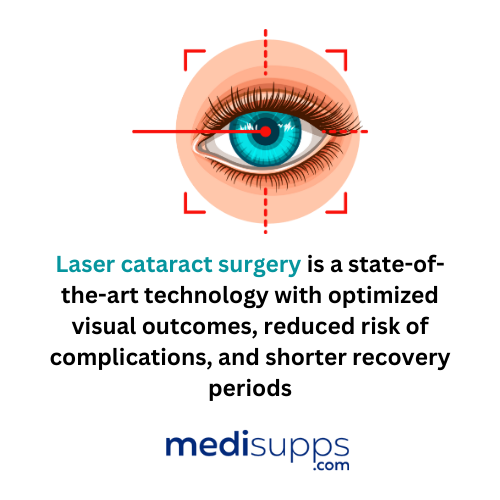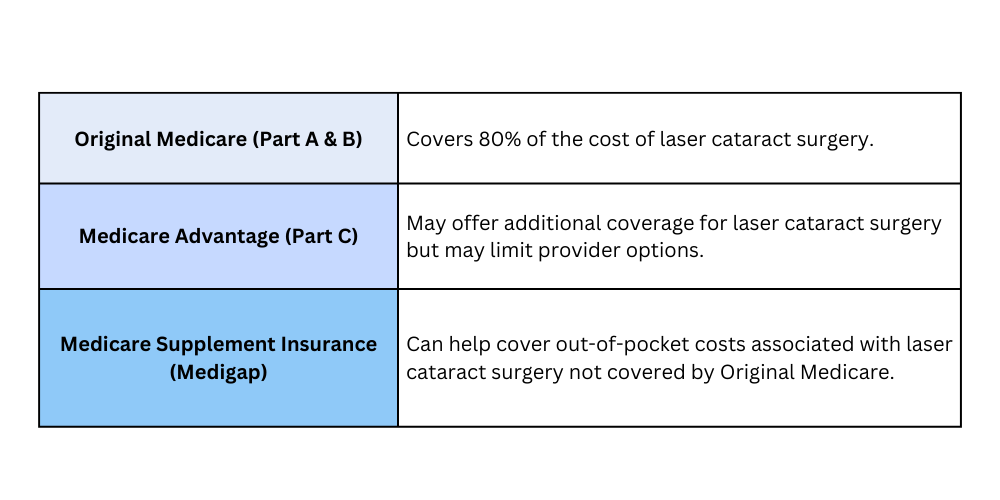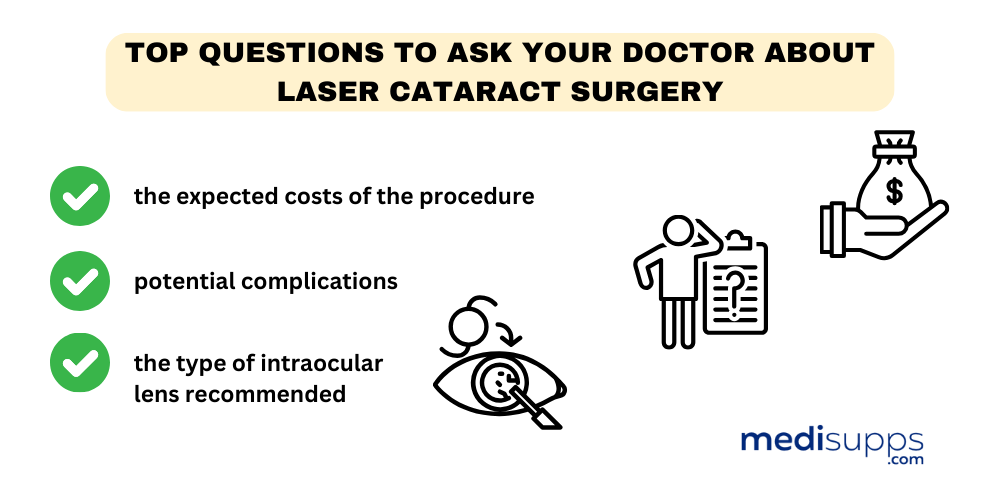
by Russell Noga | Updated December 3rd, 2023
How Much Does Medicare Pay for Laser Cataract Surgery?
 Are you or a loved one considering laser cataract surgery and curious about “how much does Medicare pay for laser cataract surgery”? You’ve come to the right place!
Are you or a loved one considering laser cataract surgery and curious about “how much does Medicare pay for laser cataract surgery”? You’ve come to the right place!
In this comprehensive guide, we’ll provide a fresh perspective on laser cataract surgery, its benefits, and how different Medicare plans can impact your costs. Get ready to gain valuable insights that will help you make informed decisions about your eye health.
Key Takeaways
- Laser cataract surgery is a state-of-the-art technology with optimized visual outcomes, reduced risk of complications, and shorter recovery periods.
- Medicare provides coverage for laser cataract surgery but the cost and extent of coverage may vary depending on individual plans.
- It is important to consider additional costs associated with Medicare coverage when planning for laser cataract surgery in order to avoid unexpected financial burdens.
Understanding Laser Cataract Surgery
Laser cataract surgery is a cutting-edge alternative to traditional cataract surgery. This advanced procedure offers numerous benefits, such as increased precision, faster recovery times, and reduced risk of complications.
As this modern approach gains popularity, comprehending Medicare’s coverage for laser cataract surgery and the factors influencing your out-of-pocket expenses becomes crucial.
View Medicare Rates for 2024
Enter Zip Code
Traditional vs. Laser Cataract Surgery
In traditional cataract surgery, manual incisions are made to remove the cloudy natural lens and replace it with an artificial intraocular lens (IOL).
On the other hand, laser cataract surgery employs a computer-guided laser for increased precision, making incisions in the cornea and the lens capsule before removing the clouded lens and inserting an IOL. This state-of-the-art technology sets laser cataract surgery apart from traditional methods.
Traditional cataract surgery utilizes tools such as forceps, scissors, and needle holders, while laser cataract surgery relies on advanced laser technology to create precise incisions and soften the cataract before removal.
This results in a quicker procedure, faster recovery, and lower risk for complications compared to traditional cataract surgery.
Benefits of Laser Cataract Surgery
Laser cataract surgery offers several key advantages over traditional methods. These include a reduced risk of complications such as corneal damage, inflammation, and bleeding, as well as improved visual outcomes and shorter recovery periods.
The benefits of laser cataract surgery include:
- Increased precision and accuracy
- Exact incisions and cataract extraction
- Greater visual acuity
- Reduced possibility of complications
- Personalized treatment plan tailored to the patient’s eye
- Optimized visual outcomes
- Faster healing
Medicare Coverage for Laser Cataract Surgery
While Medicare does cover laser cataract surgery, it’s important to be aware that there may be additional costs and limitations depending on your specific plan and coverage.
Subsequent sections will unpack further details of Medicare’s coverage for laser cataract surgery, along with factors influencing your cost.
Medicare Part B Coverage
Medicare Part B covers medically necessary cataract surgery, including laser cataract surgery.

However, patients may be responsible for coinsurance and deductibles. Does Medicare cover cataract surgery in all cases?
With Medicare Part B medical coverage, includes:
- Presurgical ophthalmologist appointments
- The surgery itself (whether traditional or laser)
- Anesthesia
- Follow-up care.
After meeting the annual Part B deductible, patients will typically be responsible for 20% coinsurance for the Medicare-approved amount for the surgery.
However, costs may vary based on your specific plan and coverage, making it necessary to comprehend your Medicare benefits and how Medicare pay factors in when preparing for laser cataract surgery.
Additional Costs and Limitations
While Medicare does cover laser cataract surgery, there may be additional surgery cost associated with upgraded intraocular lenses or other non-covered services related to the procedure.
For example, premium IOLs, such as toric or refractive IOLs, can incur additional expenses of $1,000 or more per eye, depending on the lens and provider. Thus, it’s essential to consider how to pay for cataract surgery when planning for this medical procedure.
Understanding your Medicare plan’s limitations and discussing potential additional costs with your eye doctor before undergoing laser cataract surgery is pivotal. This will help you avoid any unexpected financial burdens and ensure you receive the appropriate care for your needs.
Comparing Medicare Plans for Laser Cataract Surgery Coverage
Different Medicare plans offer varying levels of coverage for laser cataract surgery, including Original Medicare (Part A & B), Medicare Advantage (Part C), and Medicare Supplement Insurance (Medigap) plans, all of which may be covered by Medicare.
The upcoming sections will provide a closer look at the coverage and costs associated with each plan, aiding you in making an informed decision about your eye care needs.
Original Medicare (Part A & B)
Original Medicare covers 80% of the cost of laser cataract surgery. Patients are to bear the remaining 20%. This coverage includes the removal of the cataract and the insertion of a conventional intraocular lens.
However, patients may still be responsible for the Part B deductible and any additional costs associated with upgraded intraocular lenses or other non-covered services. It’s crucial to be aware of these potential expenses when planning for laser cataract surgery with Original Medicare.
Medicare Advantage (Part C)
Medicare Advantage plans may offer additional coverage for laser cataract surgery but may limit provider options. These plans typically include coverage for both traditional and laser cataract surgery, as well as certain lens implants.
Before proceeding with the procedure at an ambulatory surgical center, it’s of utmost importance to review your specific Medicare Advantage plan and comprehend its coverage for laser cataract surgery.
This will help you avoid unexpected costs and ensure you receive the appropriate care within your plan’s network.

Medicare Supplement Insurance (Medigap)
Medigap plans can help cover out-of-pocket costs associated with laser cataract surgery not covered by Original Medicare. These plans can cover expenses such as Medicare Part B’s deductible and coinsurance, ensuring you have comprehensive coverage for the surgery.
The exact coverage and benefits provided by a Medigap plan will vary depending on the plan letter chosen, Hence, it’s pivotal to review your specific plan and comprehend its coverage for laser cataract surgery prior to the procedure.
Estimating Your Costs for Laser Cataract Surgery with Medicare
The cost of laser cataract surgery with Medicare depends on factors such as:
- the facility type,
- geographic location,
- and type of intraocular lens used in the procedure.
The following sections will dissect these factors and provide handy tips to help you curtail your out-of-pocket expenses for laser cataract surgery.
Factors Affecting Costs
The cost of cataract surgery, particularly laser cataract surgery, with Medicare, can vary depending on factors such as:
- the type of facility where the procedure is performed,
- the geographic location,
- and the type of intraocular lens used.
For example, the cataract surgery cost can range from $3,000 to $5,000 per eye for standard cataract surgery and $4,000 to $6,000 per eye for laser-assisted cataract surgery or procedures involving advanced lens implants.
Understanding how much cataract surgery costs and the costs for cataract surgery can help you make informed decisions about your treatment options.
The type of intraocular lens employed in laser cataract surgery can also impact the overall cost. Premium intraocular lenses (IOLs), such as toric IOLs or refractive IOLs, tend to have higher costs in comparison to basic IOLs, ranging from $1,500 to $2,500 per lens, depending on the specific lens and provider.
Tips for Reducing Costs
To curtail costs for laser cataract surgery with Medicare, here are some steps you can take:

- Choose the right Medicare plan that covers laser cataract surgery.
- Compare different facilities that offer laser cataract surgery and their costs.
- Understand your coverage and any out-of-pocket expenses you may have. By selecting the most applicable Medicare plan, evaluating different facilities, and being cognizant of your coverage, you can minimize your out-of-pocket expenses for laser cataract surgery.
Having open communication with your eye doctor and discussing potential additional costs or limitations related to your procedure is also of paramount importance. This will ensure you’re aware of all possible expenses and can make informed decisions about your eye care needs.
Preparing for Laser Cataract Surgery with Medicare
As you gear up for laser cataract surgery with Medicare, asking your doctor important questions and understanding your plan’s coverage is of great significance.
This will help you avoid unexpected costs, ensure you receive the appropriate care, and make the process as smooth as possible.
Questions to Ask Your Doctor
When discussing laser cataract surgery with your doctor, it’s important to ask the right questions. Some essential inquiries include:
- the expected costs of the procedure,
- potential complications,
- and the type of intraocular lens recommended.
By asking these questions, you can gain a better understanding of your unique situation and make informed decisions about your eye care needs.

Your doctor should be able to provide you with detailed information about the procedure, the risks involved, and the potential benefits of laser cataract surgery.
Understanding Your Medicare Plan’s Coverage
Comprehending your Medicare plan’s coverage for laser cataract surgery is pivotal to prevent unexpected costs and ensure you receive the right care. Review your Summary of Benefits and Coverage, and verify with your plan provider the specific coverage details for laser cataract surgery.
Knowing what your plan covers is of utmost importance. This includes:
- The removal of the cataract
- The insertion of a conventional intraocular lens
- Any potential additional costs associated with upgraded intraocular lenses or other non-covered services
This knowledge will help you plan for your procedure and make informed decisions about your eye care needs.
Additional Considerations for Cataract Surgery and Medicare
Apart from understanding your Medicare coverage for laser cataract surgery, there are additional considerations to keep in mind, such as preventing cataracts and post-surgery vision care.
The following sections will delve into these factors, helping you make well-informed decisions about your eye health.
Preventing Cataracts
 While some risk factors for cataract development, such as aging, are unavoidable, there are lifestyle changes you can make to reduce your risk of developing cataracts. These include:
While some risk factors for cataract development, such as aging, are unavoidable, there are lifestyle changes you can make to reduce your risk of developing cataracts. These include:
- quitting smoking,
- limiting alcohol consumption,
- and protecting your eyes from harmful UV exposure.
By making these changes, you can not only help prevent cataracts but also improve your overall eye health and reduce the need for laser cataract surgery in the future.
Post-Surgery Vision Care
Post cataract surgery, Medicare provides coverage for one pair of glasses or contact lenses to aid your vision. However, Original Medicare might not cover routine eye exams and other vision care.
It’s important to understand your plan’s coverage for post-surgery vision care to avoid unexpected costs and ensure you receive the appropriate care.
Some Medicare Advantage plans and Medigap plans may offer additional vision benefits, such as coverage for routine eye exams or prescription lenses.
Be sure to review your specific plan’s coverage and consider any additional vision care needs you may have, including glasses after cataract surgery, and whether your plan will cover cataract surgery.
Summary
In conclusion, understanding the costs and coverage associated with laser cataract surgery is essential for making informed decisions about your eye care. By comparing different Medicare plans, asking the right questions, and considering additional factors such as cataract prevention and post-surgery vision care, you can ensure you receive the best possible care for your unique needs.
Remember, knowledge is power, and being well-informed about your Medicare coverage and options will help you navigate the world of laser cataract surgery with confidence.
Get Quotes Now
Enter Zip Code
Frequently Asked Questions
Is laser cataract surgery worth the extra cost?
Overall, laser-assisted cataract surgery and traditional cataract surgery yield similarly successful results, so the additional cost of laser cataract surgery may not be justified.
What type of cataract surgery does Medicare not pay for?
Medicare does not cover cataract surgery with toric lens implants or astigmatism correction, nor does it cover elective surgery primarily to correct vision from nearsightedness or astigmatism, known as “refractive lens exchanges.”
How much does Medicare pay for cataract surgery in 2023?
In 2023, Medicare covers $1,431 of the total cost of $1,789 for cataract surgery, leaving the patient responsible for the remaining $357.
At what point will Medicare pay for cataract surgery?
Paragraph 1: Medicare covers cataract surgery if it’s medically necessary and done using traditional surgical techniques or lasers. Medicare will provide 80% coverage of the costs, including post-surgery eyeglasses or contacts.
How much does Medicare cover for laser cataract surgery?
Medicare generally covers 80% of the cost of laser cataract surgery, with patients responsible for the remaining 20%.
Find the Right Medicare Plan for You
Finding the right Medicare Plan 2024 doesn’t have to be confusing. Whether it’s a Medigap plan, or you want to know how much Medicare pays for laser cataract surgery, we can help.
Call us today at 1-888-891-0229 and one of our knowledgeable, licensed insurance agents will be happy to assist you!

Russell Noga is the CEO and Medicare editor of Medisupps.com. His 15 years of experience in the Medicare insurance market includes being a licensed Medicare insurance broker in all 50 states. He is frequently featured as a featured as a keynote Medicare event speaker, has authored hundreds of Medicare content pages, and hosts the very popular Medisupps.com Medicare Youtube channel. His expertise includes Medicare, Medigap insurance, Medicare Advantage plans, and Medicare Part D.


